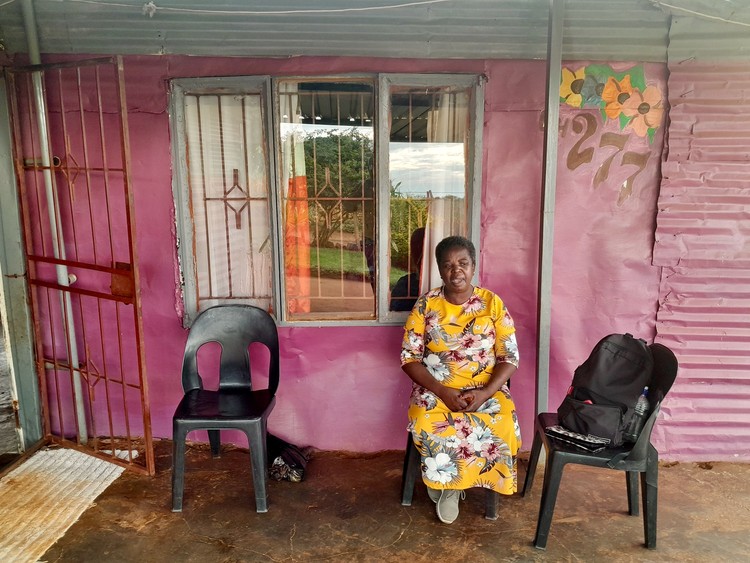Corruption blamed for ten-year delay in service delivery in Tshwane settlement
Councillor says the area first has to be rezoned
Fridah Molefe says she has lived in Ga-Rankuwa View Extension 15 since 2015 and she has never had any services from the City of Tshwane. She uses a bucket as a toilet at night and empties it in the bush in the morning. Photo: Chris Gilili
- About 3,000 people in Ga-Rankuwa View Extension 15, Tshwane, live without toilets, water or formal electrification.
- Many residents have been living in these conditions for ten years.
- The ward councillor says the area needs to be rezoned and services “are in the pipeline”.
About 700 families with 3,000 people in Ga-Rankuwa View Extension 15 informal settlement, Tshwane, have been living since 2012 without toilets, running water or formal electrification.
Fridah Molefe, a mother of three, arrived in 2015. He says she has seen a parade of politicians making promises but doing nothing.
“The DA leader then … came here in 2016 and saw everything. He promised to fix our problems. We gave him a tour of the place to see the squalor we live in. They took photos. They gave us T-shirts and asked us to vote for them. But we never saw them again,” she says.
Today the ward councillor is Violet Phalwane of the ANC. “But nothing has come,” says Molefe. “She can’t even give us a water tanker.”
“I use a bucket to relieve myself, and throw it in the bush the following morning. That is very humiliating to me as a woman, but we have no choice,” she said.
“They once brought us bucket toilets, but after four months they took them away. We have no water, and no roads here.”
Illegal connections crisscross in the settlement, hooked up to a large transformer that has the smell of an electrical fire. The roads are dirt and mud. Water is fetched from neighbouring RDP houses. Some people syphon water using informal water connections.
Lerato Moobi said she has approached the City of Tshwane to seek services several times.
“It’s raining today, the power will go off, and we have to ask the men in the area to fix it for us,” says Moobi. “We have protested to no avail. We feel like we have been dumped here and people we trusted have disappointed us.”
Community committee leader Peter Ngobeni said, “Some areas that started a few years ago have electricity and proper sanitation, except us. We are tired of fighting. Last year, this place was full of politicians campaigning. After elections, they are gone.”
Ward 30 Councillor Phalwane said the area is in the process of being formalised. Regarding the toilets, she said the service provider’s contract had lapsed and the City had not appointed a new one.
She said the service provider had also done a poor job. “They put the toilets only in one section.”
“The City has budget constraints and this is what they always bring when we request services,” she said.
“They are trying to first rezone the place. And figure out if it’s suitable for electricity and water services. Then power will be given. They are in the pipeline,” said Phalwane.
South African National Civic Organization greater Tshwane chairperson Abram Mashishi blamed corruption for poor services.
“The City of Tshwane is actually bankrupt. They can’t afford to pay for anything. They can’t pay their R1.4-billion debt to Eskom. They owe Rand Water R1-billion …The City has failed the people and it’s crumbling. The people are on their own,” said Mashishi.
Sipho Stuurman, spokesperson for the mayor, said, “The ANC administrators took over in 2020, and did so much damage. They left the City with a R4-billion deficit. As the new administration, we had to start from that. We were on a backfoot. We acknowledge our Eskom debt and we will make monthly payments.”
Support independent journalism
Donate using Payfast

Don't miss out on the latest news
We respect your privacy, and promise we won't spam you.
Next: Queer people and sex workers are badly treated in clinics, new survey finds
Previous: Outsourced guards accuse Ekurhuleni municipality of failing to pay them
© 2023 GroundUp. This article is licensed under a Creative Commons Attribution-NoDerivatives 4.0 International License.
You may republish this article, so long as you credit the authors and GroundUp, and do not change the text. Please include a link back to the original article.
We put an invisible pixel in the article so that we can count traffic to republishers. All analytics tools are solely on our servers. We do not give our logs to any third party. Logs are deleted after two weeks. We do not use any IP address identifying information except to count regional traffic. We are solely interested in counting hits, not tracking users. If you republish, please do not delete the invisible pixel.

